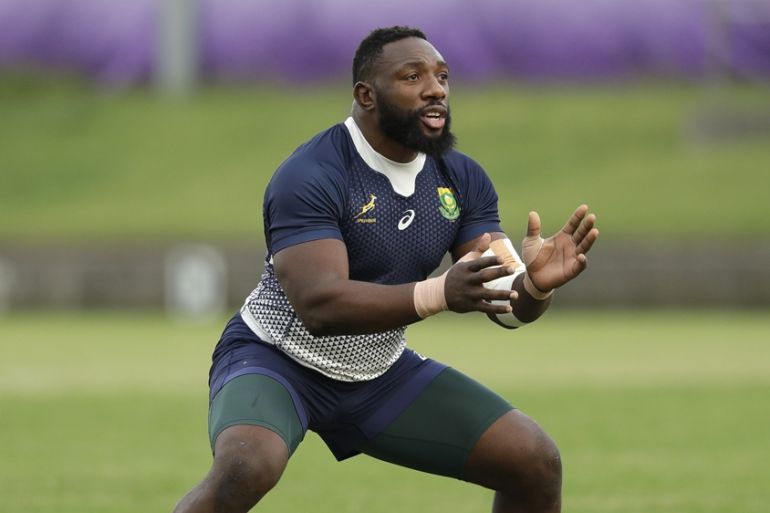Tendai Mtawarira: From South Africa debut to winning World Cup
Mtawarira, who hails from Zimbabwe, looks back at his rugby career which almost derailed before taking off.

The racial diversity of the South Africa rugby squad that won the 2019 World Cup meant the latest triumph has done more than the previous two titles to unite the once bitterly-divided country, member of the winning squad Tendai Mtawarira has said.
Zimbabwe-born Mtawarira (affectionately known as Beast) survived a spirited effort earlier in his career to block him from playing for the Springboks because he was not a South African citizen.
Keep reading
list of 4 itemsEngland hold on to beat Argentina in Rugby World Cup third place playoff
South African hooker Mbonambi cleared to play in Rugby World Cup final
Late kick gives South Africa ‘ugly’ win over England in Rugby World Cup
The Springboks defeated England 32-12 in the final on November 2 in Japan and Mtawarira, 34, said being world champions under his adopted country’s first black rugby captain felt “pretty special”.
“I think winning the [2019] World Cup was really special, especially with Siya as a black captain,” Mtawarira told Al Jazeera.
“It brought the country together. I had no idea what it really meant to the country until we actually got to South Africa and did the trophy tours around the country. So many people came out to cheer the moment, that’s when I realised that this thing has just really impacted the entire country.
“I feel that the other World Cups would have been special, but I feel this one, particularly at this point in time, has been pretty special especially with how the team achieved it.”
‘Really grateful’
Following a career that yielded 117 caps, the most capped prop in Springbok history retired from international rugby after helping the team win the record-equaling World Cup title.
A popular figure around the rugby world, Mtawarira’s retirement was met with sadness among his legion of fans, who posted touching farewell messages on different social media platforms.
But 10 years ago, his future as a Springbok was thrown into doubt after it emerged he did not have a residency permit.
|
|
Mtawarira qualified to play for South Africa in line with the eligibility rules of rugby’s world governing body, which gave him the green light based on residency criteria.
But the South African government ruled that fielding a foreigner violated the laws of the country. In November 2009, it ordered the immediate axing of the Zimbabwean prop until proper documentation was obtained.
After an application was lodged for citizenship by the SA Rugby Union (Saru), helped by spirited lobbying efforts from renowned personalities such as the Archbishop Desmond Tutu, Mtawarira was finally granted citizenship in June 2010.
“It was a dream come true for me to represent the Springboks,” says Mtawarira. “It’s something I dreamt would happen when I was a youngster, but it’s still surreal that it actually happened.
“To get to 50 caps was such a huge honour, let alone 117. The World Cup is accumulation of things I had been working hard for. I wanted to retire last year. What motivated me to keep going was that I wanted to give it one more shot at winning the World Cup. It was my dream to walk away with that accolade.”
Earlier this month, Mtawarira signed for Washington, DC-based Major Rugby League club Old Glory after he initially arrived in the United States on vacation.
The Old Glory deal was brokered by a sports marketing company, Kyros Sports, co-owned by Mtawarira and his US-based Zimbabwean childhood friend Kisset Chirengende.
Chirengende played rugby for the Bradford & Bingley club in the lower divisions of the English rugby union system.
“Just seeing his work ethic has really inspired me to put the same effort into what I do,” Chirengende said.
“The guy just never stops, man. For real. It’s ridiculous how much he works, behind the scenes, his private workouts. It’s just his fortitude, his mental strength. Every time he got dropped from the Springboks, which wasn’t that many times, he would still have a positive outlook.
“He didn’t want to be on the bench. He hated it. He would say: ‘I have to work harder and I will be back in it’.”
|
|
Former Zimbabwe captain Denford Mutamangira was on the same school team as Mtawarira in Harare.
“Beast hasn’t changed that much,” Mutamangira recalls. “He has always been a man of few words, but a man of action. The way he was so pumped up when the Boks scored, or won a scrum [in the World Cup final], that’s Beast for you.
“He is a humble, down-to-earth individual who always tries to make a difference in other people’s lives. We have remained friends over the years and he has supported me in my Zimbabwe career.”
Mtawarira has a foundation aimed at introducing rugby to the rural areas of Zimbabwe, a country that often produces top-class players, with quite a few, like himself, going on to represent other countries.
“I hope to start some sort of scrum clinic and academy, a state-of-the-art facility where youngsters can be trained,” Mtawarira expands on his vision for Zimbabwe.
“I’m also looking at mentoring them. That is a huge thing for kids getting into a professional setup, or just about to get into one. That’s one thing that makes or breaks players trying to get to the top.”
Mtawarira started his training on a donated bicycle and said he did not have a lot of clothes.
“It was really hard for me coming from Zimbabwe. I wasn’t well-resourced. And the possibility of not playing for the Springboks after the citizenship saga is one thing that took a toll on me.
“If it wasn’t for a few people, especially Desmond Tutu, who came to my aid and helped me get my citizenship, I wouldn’t be here. So I’m really grateful to the Arch.”